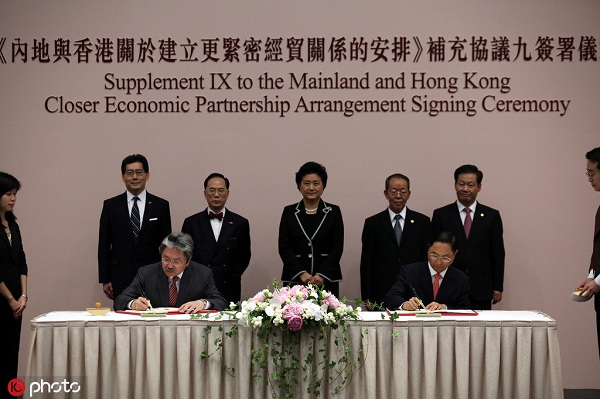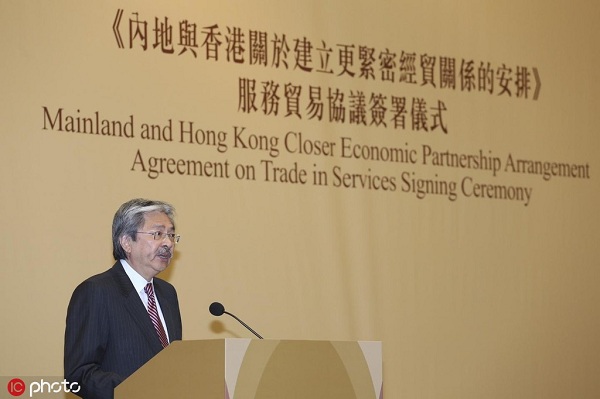CEPA helps Greater Bay Area increase market integration

The Ministry of Commerce has set up a special economic and trade team to study and formulate policy measures in the business field to support the construction of the Guangdong-Hong Kong-Macao Greater Bay Area.
Guangdong province, Hong Kong SAR, and Macao SAR will further promote the efficient and convenient flow of goods, services, personnel, funds, and other elements in the Greater Bay Area through CEPA (Closer Economic Partnership Arrangement) of the three areas.
In addition, the Chinese mainland will open up service trade to Hong Kong and Macao through the pilot of CEPA. It also actively supports the Greater Bay Area to enhance the level of market integration and create a world-class business environment.
As an important platform for economic cooperation between the Chinese mainland, Hong Kong, and Macao, CEPA is not only a free trade agreement with the highest degree of market opening in the Chinese mainland, but also the most important policy support to promote market integration of Guangdong, Hong Kong, and Macao.

Hong Kong's financial secretary John Tsang Chun-wah (L) and deputy commerce minister Jiang Yaoping sign agreement in 2012. [Photo/IC]
CEPA was officially signed in Hong Kong in June 2003. Thereafter, in the 10 years from 2004 to 2013, the two parties signed a supplementary agreement every year. At the end of 2015, the Service Trade Agreement, the first sub-agreement of CEPA, was signed to promote the liberalization of service trade between the Chinese mainland and Hong Kong.

Hong Kong's financial secretary John Tsang Chun-wah delivers a speech at the signing ceremony of CEPA in 2015. [Photo/IC]
In June and December 2017, the Chinese mainland, Hong Kong, and Macao signed an investment agreement and economic and technological cooperation agreement under CEPA, marking a new stage of economic and trade exchanges between the Chinese mainland, Hong Kong, and Macao.
In December 2018, the Chinese mainland signed the Agreement on Trade in Goods respectively under CEPA with Hong Kong and Macao. Imports of goods originating in Hong Kong will fully eliminate tariffs. The agreement also proposes a series of cooperative measures to promote the facilitation of trade in goods, such as carrying out a new customs clearance mode and exploring various cooperative inspection modes, to improve the customs clearance capacity and efficiency of port goods, as well as facilitate freely the flow of goods in the Greater Bay Area.
In 2017, Guangdong's import and export volume to Hong Kong and Macao, actual investment of Hong Kong and Macao, and investment in Hong Kong and Macao accounted for 17.3 percent, 82.8 percent and 57.5 percent of the province respectively. Guangdong has shown great enthusiasm with CEPA so far, but more policies are required to help stimulate the participation of Hong Kong and Macao.
MOST POPULAR
- 1 China Daily's 'Shopping in China' platform appeals to intl audiences
- 2 China updates Catalogue of Encouraged Industries for Foreign Investment
- 3 Policies concerning expats, foreign enterprises in December 2025
- 4 China becomes the world's fourth manufacturing power
- 5 China ascends global higher education ranking







